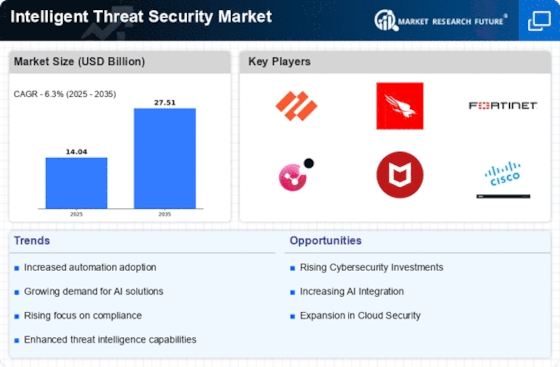Market Share
Intelligent Threat Security Market Share Analysis
These positioning tactics are an attempt by firms to separate themselves from their competitors and reap the profits that come with rising demands for highly-refined cybersecurity products in a continually evolving Intelligent Threat Security Market. Stressing superior features, technology or services is common in differentiating offers from rivals. In this way the company develops a unique identity, which in turn attracts customers seeking innovative approaches. Another important tactic
These positioning tactics are an attempt by firms to separate themselves from their competitors and reap the profits that come with rising demands for highly-refined cybersecurity products in a continually evolving Intelligent Threat Security Market. Stressing superior features, technology or services is common in differentiating offers from rivals. In this way the company develops a unique identity, which in turn attracts customers seeking innovative approaches. Another important tactic is cost leadership, the efforts to be the market's lowest-cost manufacturers.
By reducing process costs through streamlining operations, taking advantage of economies of scale and investing in cost-efficient technology businesses can attract price competitors with low prices. Under these circumstances, this buying strategy really shines. In addition, many firms tend to apply a niche market strategy. Special industries and subgroups of customers can have special needs in terms of cybersecurity measures. Focusing like a laser, businesses can become thought leaders in their field. Clients who are serious about industry-specific security standards will be willing to entrust your brand with the safety of all they hold dear. With enterprises realizing the importance of tailor-made solutions, using this method companies may carve out a market share for themselves in a smaller niche.
As far as the Intelligent Threat Security Market is concerned, collaboration and strategic alliances are also vital factors in establishing market share. Businesses can form alliances with other players in the cybersecurity field, technology providers or even market leaders so as to get their hands on complementary resources and exchange information. The hope is that this will increase influence too. These relationships mean that customers get more comprehensive solutions including those addressing a broader variety of security concerns. This boosts the value offered as well.
Besides, in the boisterous and competitive environment of intelligent threat security, only those who innovate will gain a foothold in market. Compared to the businesses that spend money on R & D in order to keep up with technology, even low quality ones are more attractive. This strategy's two goals are attracting early adopters and becoming an industry leader to establish the firm. Customer-centered tactics also greatly benefit market share positioning. By making serious and tireless efforts to provide a higher level of service than expected as well as more emotional connections, while actively seeking their opinion in every aspect, a company can establish the trust and loyalty of its customers. When consumers are pleased with a product or service, they tend to recommend it more which increases the company's visibility and sales.
is cost leadership, the efforts to be the market's lowest-cost manufacturers. By reducing process costs through streamlining operations, taking advantage of economies of scale and investing in cost-efficient technology businesses can attract price competitors with low prices. Under these circumstances, this buying strategy really shines. In addition, many firms tend to apply a niche market strategy. Special industries and subgroups of customers can have special needs in terms of cybersecurity measures. Focusing like a laser, businesses can become thought leaders in their field. Clients who are serious about industry-specific security standards will be willing to entrust your brand with the safety of all they hold dear. With enterprises realizing the importance of tailor-made solutions, using this method companies may carve out a market share for themselves in a smaller niche. As far as the Intelligent Threat Security Market is concerned, collaboration and strategic alliances are also vital factors in establishing market share. Businesses can form alliances with other players in the cybersecurity field, technology providers or even market leaders so as to get their hands on complementary resources and exchange information. The hope is that this will increase influence too. These relationships mean that customers get more comprehensive solutions including those addressing a broader variety of security concerns. This boosts the value offered as well. Besides, in the boisterous and competitive environment of intelligent threat security, only those who innovate will gain a foothold in market. Compared to the businesses that spend money on R & D in order to keep up with technology, even low quality ones are more attractive. This strategy's two goals are attracting early adopters and becoming an industry leader to establish the firm. Customer-centered tactics also greatly benefit market share positioning. By making serious and tireless efforts to provide a higher level of service than expected as well as more emotional connections, while actively seeking their opinion in every aspect, a company can establish the trust and loyalty of its customers. When consumers are pleased with a product or service, they tend to recommend it more which increases the company's visibility and sales.

















Leave a Comment